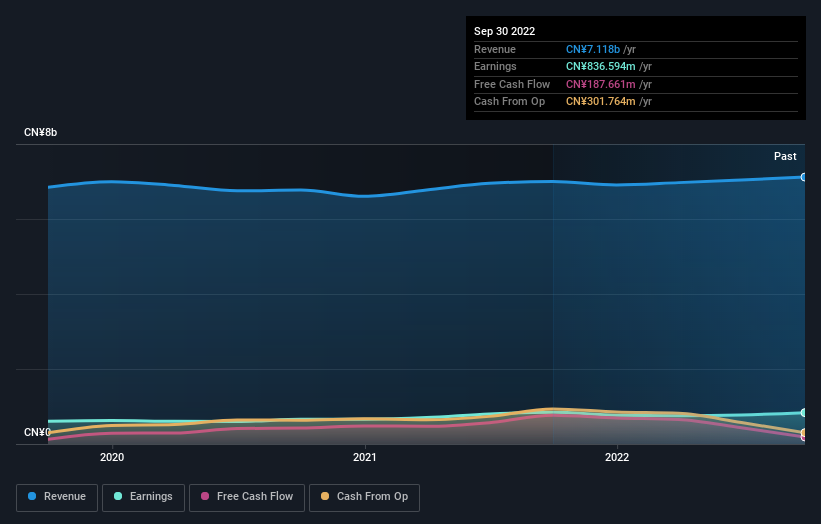Tianjin Pharmaceutical Da Ren Tang Group Corporation Limited's (SGX:T14) largest shareholders are individual investors with 49% ownership, private companies own 43%
If you want to know who really controls Tianjin Pharmaceutical Da Ren Tang Group Corporation Limited (SGX:T14), then you'll have to look at the makeup of its share registry. And the group that holds the biggest piece of the pie are individual investors with 49% ownership. That is, the group stands to benefit the most if the stock rises (or lose the most if there is a downturn).
Meanwhile, private companies make up 43% of the company’s shareholders.
In the chart below, we zoom in on the different ownership groups of Tianjin Pharmaceutical Da Ren Tang Group.
Check out our latest analysis for Tianjin Pharmaceutical Da Ren Tang Group
What Does The Institutional Ownership Tell Us About Tianjin Pharmaceutical Da Ren Tang Group?
Institutions typically measure themselves against a benchmark when reporting to their own investors, so they often become more enthusiastic about a stock once it's included in a major index. We would expect most companies to have some institutions on the register, especially if they are growing.
We can see that Tianjin Pharmaceutical Da Ren Tang Group does have institutional investors; and they hold a good portion of the company's stock. This can indicate that the company has a certain degree of credibility in the investment community. However, it is best to be wary of relying on the supposed validation that comes with institutional investors. They too, get it wrong sometimes. If multiple institutions change their view on a stock at the same time, you could see the share price drop fast. It's therefore worth looking at Tianjin Pharmaceutical Da Ren Tang Group's earnings history below. Of course, the future is what really matters.
Hedge funds don't have many shares in Tianjin Pharmaceutical Da Ren Tang Group. Jinhushen Biomedical Technology Co., Ltd. is currently the largest shareholder, with 43% of shares outstanding. For context, the second largest shareholder holds about 1.5% of the shares outstanding, followed by an ownership of 1.1% by the third-largest shareholder.
After doing some more digging, we found that the top 16 have the combined ownership of 50% in the company, suggesting that no single shareholder has significant control over the company.
Researching institutional ownership is a good way to gauge and filter a stock's expected performance. The same can be achieved by studying analyst sentiments. We're not picking up on any analyst coverage of the stock at the moment, so the company is unlikely to be widely held.
Insider Ownership Of Tianjin Pharmaceutical Da Ren Tang Group
While the precise definition of an insider can be subjective, almost everyone considers board members to be insiders. Management ultimately answers to the board. However, it is not uncommon for managers to be executive board members, especially if they are a founder or the CEO.
Insider ownership is positive when it signals leadership are thinking like the true owners of the company. However, high insider ownership can also give immense power to a small group within the company. This can be negative in some circumstances.
We can report that insiders do own shares in Tianjin Pharmaceutical Da Ren Tang Group Corporation Limited. This is a big company, so it is good to see this level of alignment. Insiders own US$50m worth of shares (at current prices). It is good to see this level of investment by insiders. You can check here to see if those insiders have been buying recently.
General Public Ownership
The general public, who are usually individual investors, hold a 49% stake in Tianjin Pharmaceutical Da Ren Tang Group. This size of ownership, while considerable, may not be enough to change company policy if the decision is not in sync with other large shareholders.
Private Company Ownership
We can see that Private Companies own 43%, of the shares on issue. It might be worth looking deeper into this. If related parties, such as insiders, have an interest in one of these private companies, that should be disclosed in the annual report. Private companies may also have a strategic interest in the company.
Next Steps:
I find it very interesting to look at who exactly owns a company. But to truly gain insight, we need to consider other information, too. To that end, you should be aware of the 1 warning sign we've spotted with Tianjin Pharmaceutical Da Ren Tang Group .
Of course, you might find a fantastic investment by looking elsewhere. So take a peek at this free list of interesting companies.
NB: Figures in this article are calculated using data from the last twelve months, which refer to the 12-month period ending on the last date of the month the financial statement is dated. This may not be consistent with full year annual report figures.
Have feedback on this article? Concerned about the content? Get in touch with us directly. Alternatively, email editorial-team (at) simplywallst.com.
This article by Simply Wall St is general in nature. We provide commentary based on historical data and analyst forecasts only using an unbiased methodology and our articles are not intended to be financial advice. It does not constitute a recommendation to buy or sell any stock, and does not take account of your objectives, or your financial situation. We aim to bring you long-term focused analysis driven by fundamental data. Note that our analysis may not factor in the latest price-sensitive company announcements or qualitative material. Simply Wall St has no position in any stocks mentioned.
Join A Paid User Research Session
You’ll receive a US$30 Amazon Gift card for 1 hour of your time while helping us build better investing tools for the individual investors like yourself. Sign up here


